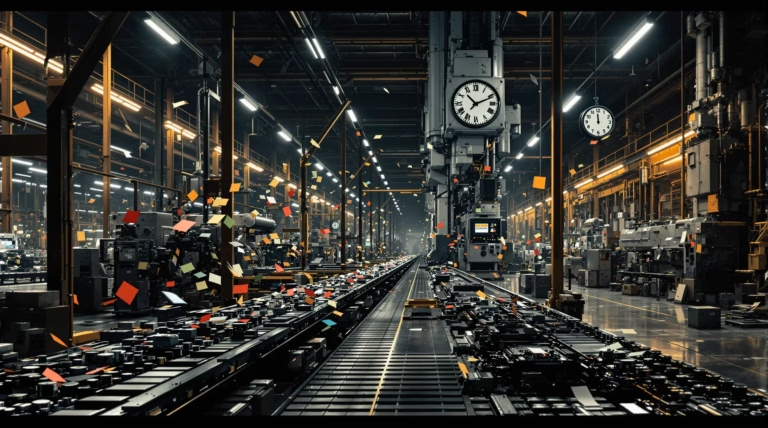Production Scheduler: Key Responsibilities and Skills Explained
In today’s fast-paced manufacturing environment, production schedulers play a vital role in orchestrating efficient operations and ensuring timely product delivery. Let’s explore the essential aspects of this crucial position and understand how it impacts manufacturing success.
Understanding the Role of a Production Scheduler
Production schedulers operate at the critical intersection of planning, logistics, and production, developing comprehensive schedules that balance multiple competing priorities. Their expertise directly influences a company’s ability to meet customer deadlines while optimizing resource utilization and maintaining cost-effectiveness.
What is a Production Scheduler?
A production scheduler transforms manufacturing requirements into actionable schedules that guide daily operations. Their role encompasses three primary functional areas:
- Production schedule management – creating, analyzing, and releasing schedules
- Production scheduling administration – configuring and maintaining scheduling systems
- Data management – ensuring accurate information availability for effective scheduling
Importance of Production Scheduling in Manufacturing
Effective production scheduling delivers multiple benefits to manufacturing operations:
- Synchronizes all elements of the manufacturing process
- Prevents bottlenecks and resource conflicts
- Optimizes production runs and minimizes equipment changeovers
- Reduces manufacturing and inventory carrying costs
- Improves equipment utilization and return on capital investments
- Enhances customer satisfaction through better on-time delivery rates
Key Responsibilities of a Production Scheduler
Production schedulers manage critical responsibilities that directly impact manufacturing efficiency and organizational success. They serve as the operational hub connecting planning with execution, ensuring smooth production flows while adapting to changing conditions.
Developing and Managing Production Schedules
The core responsibilities include analyzing production requirements, assessing resource availability, and sequencing production orders to maximize efficiency. Schedulers must maintain schedule integrity while making real-time adjustments for unexpected changes such as:
- Machine breakdowns
- Material shortages
- Rush orders
- Equipment maintenance requirements
- Labor availability fluctuations
Coordinating with Different Departments
| Department | Coordination Focus |
|---|---|
| Sales | Order priorities and delivery commitments |
| Procurement | Material availability and timing |
| Maintenance | Equipment downtime scheduling |
| Production | Labor and machine capacity |
| Warehouse | Finished goods management and shipping coordination |
Monitoring Production Progress
Production schedulers maintain vigilant oversight of manufacturing operations through real-time tracking of established schedules. They implement comprehensive monitoring systems that provide instant visibility into:
- Work center status and performance
- Job completion percentages
- Potential bottlenecks and constraints
- Resource utilization rates
- Production flow efficiency
Time management metrics form the foundation of effective monitoring. Schedulers track and analyze:
| Metric Category | Key Performance Indicators |
|---|---|
| Production Efficiency | On-time completion rates, throughput times |
| Resource Utilization | Machine uptime, labor efficiency |
| Quality Control | Defect rates, rework percentages |
| Cost Management | Production costs, efficiency ratios |
Essential Skills for a Production Scheduler
Modern production schedulers combine technical expertise with advanced soft skills to navigate complex manufacturing environments. Their proficiency spans specialized scheduling software, manufacturing processes, and supply chain dynamics, complemented by strong interpersonal abilities for cross-departmental coordination.
Technical Skills and Software Proficiency
Success in production scheduling requires mastery of various technical tools and platforms, including:
- Specialized scheduling software (Primavera P6, MS Project)
- ERP system modules and configurations
- Microsoft Excel for advanced data analysis
- Materials Requirement Planning (MRP) systems
- Manufacturing Execution Systems (MES)
- Capacity planning tools and algorithms
Analytical and Problem-Solving Skills
Production schedulers employ sophisticated analytical approaches to optimize manufacturing flows, including:
- Historical performance data analysis
- Resource availability assessment
- Demand forecast interpretation
- Bottleneck identification and prevention
- Schedule impact evaluation
- Trade-off analysis between competing objectives
Communication and Interpersonal Skills
Effective schedulers excel in cross-functional communication, serving as vital links between departments. Their interpersonal responsibilities include:
- Translating technical information into clear directives
- Negotiating with suppliers on material deliveries
- Coordinating with maintenance teams
- Building consensus around schedule changes
- Facilitating cross-departmental collaboration
- Managing stakeholder expectations
Challenges Faced by Production Schedulers
Production schedulers operate in an environment filled with complex variables and competing priorities. The core challenge lies in managing multiple interdependent factors simultaneously:
- Equipment capabilities and limitations
- Workforce availability and scheduling
- Material procurement and lead times
- Customer deadline requirements
- Resource constraints and limitations
- Technology access and implementation
Dealing with Unforeseen Delays
Unexpected disruptions can quickly derail even the most meticulously planned production schedules. Common challenges include:
- Equipment malfunctions and breakdowns
- Material supply shortages
- Quality control issues
- Staff absences and availability
- Production line bottlenecks
Effective schedulers implement robust contingency strategies through:
- Strategic time buffer placement
- Alternative production routing options
- Real-time communication with floor supervisors
- Dynamic workload rebalancing
- Priority-based order protection systems
Balancing Demand and Capacity
| Demand Scenario | Required Actions |
|---|---|
| High Demand | Order prioritization, timeline management, stakeholder communication |
| Low Demand | Resource optimization, inventory control, efficiency maintenance |
Production schedulers must coordinate across the entire supply chain, ensuring:
- Timely material procurement
- Efficient production line balancing
- Effective changeover management
- Optimal finished goods flow
- Implementation of advanced scheduling methodologies (TOC, Drum-Buffer-Rope)
Conclusion: The Future of Production Scheduling
Production schedulers serve as critical operational coordinators, bridging the gap between planning and execution. Their role encompasses inventory management, changeover optimization, and production efficiency enhancement. The integration of advanced technologies is transforming the field through:
- AI-powered scheduling algorithms
- Machine learning pattern recognition
- Real-time production tracking
- Automated resource optimization
- Industry 4.0 integration capabilities







